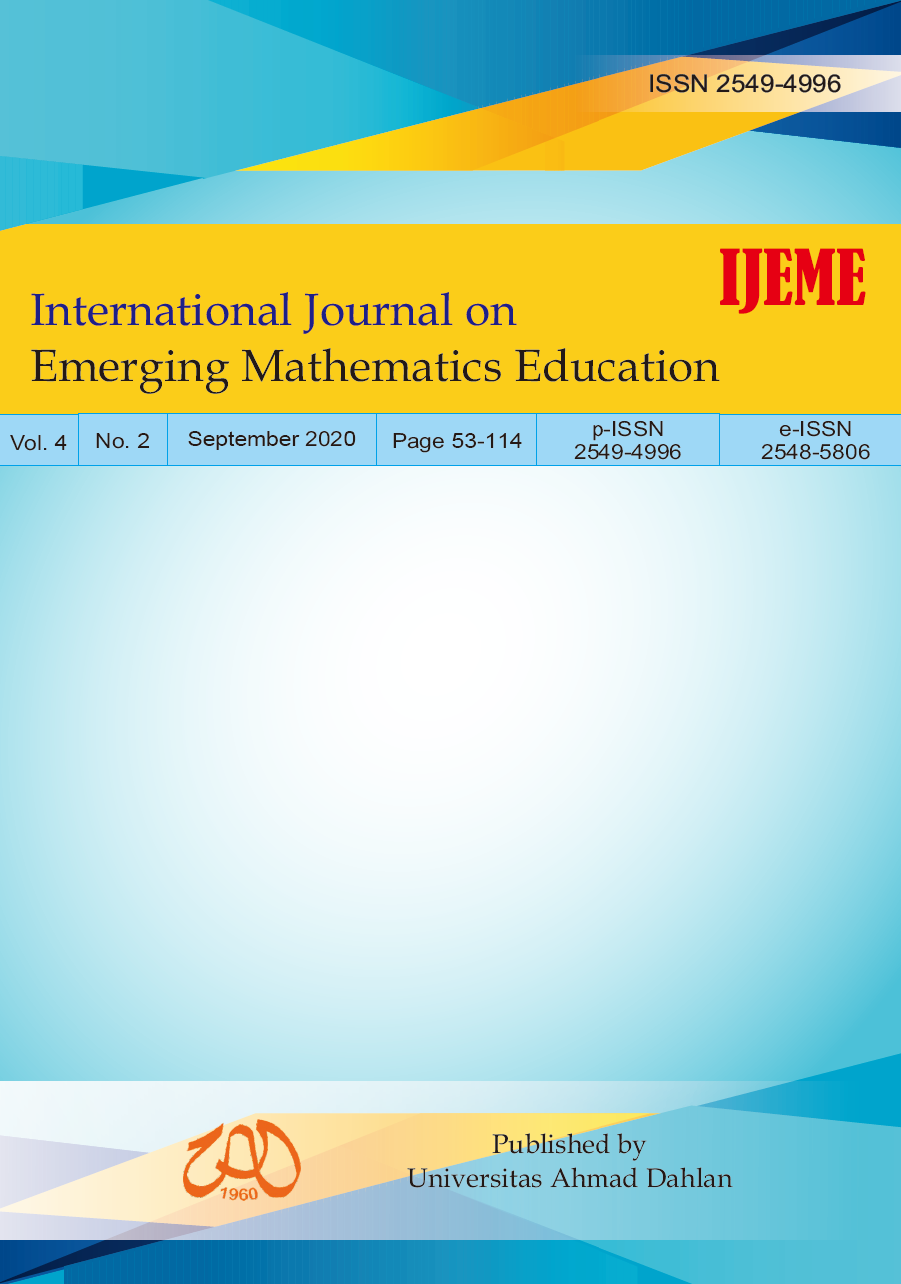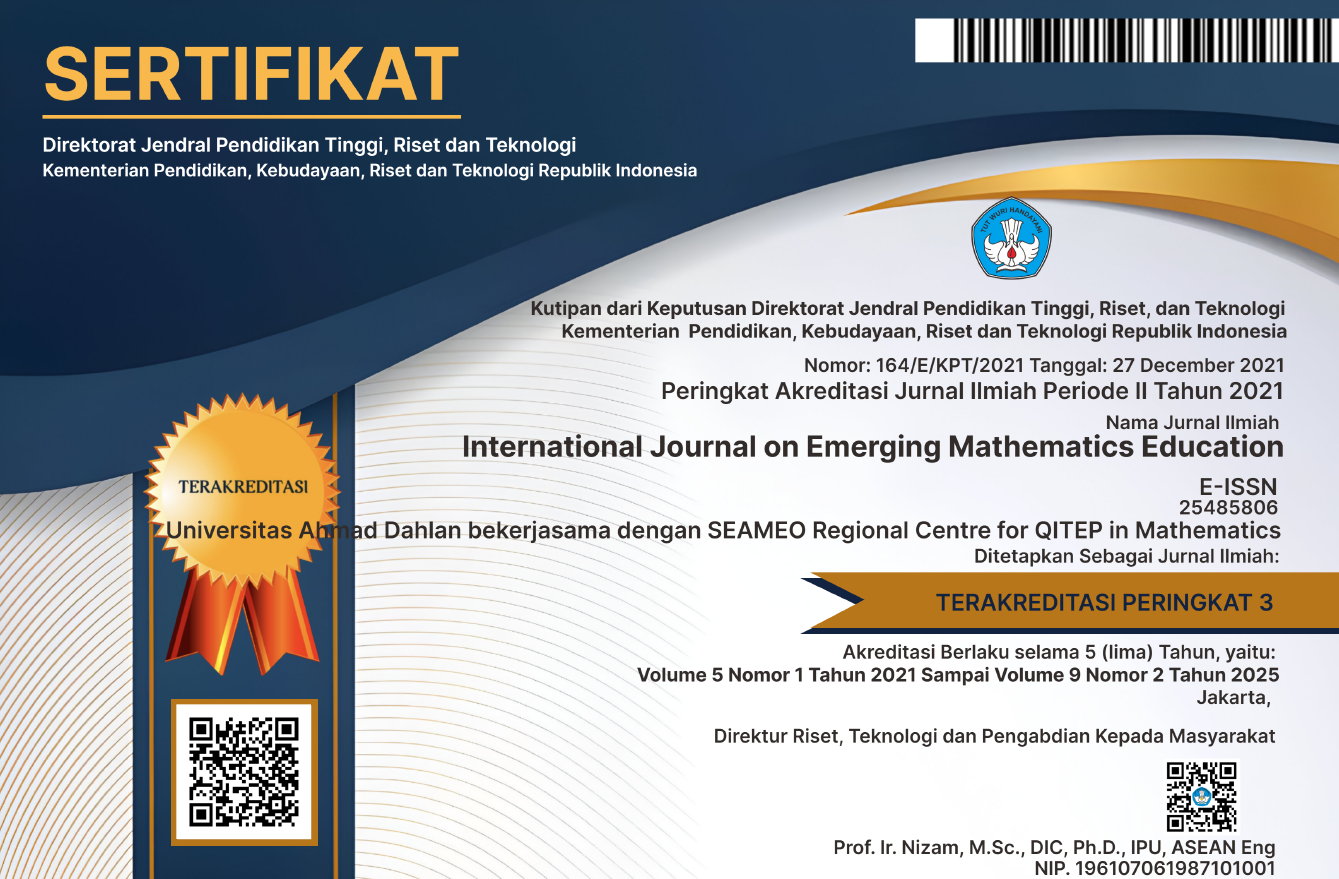Development of Calculus Teaching Material: Context of Universitas Timor, Indonesia
DOI:
https://doi.org/10.12928/ijeme.v4i2.15976Keywords:
development, teaching materials, derivative calculus, constructivismAbstract
This research development aims to producing a valid, practical, and useful deferential calculus teaching material. The teaching material referred to this study is a student worksheet with a constructivism approach. Itapplied development research method with formative research type. It was conducted in two stages, namely preliminary analysis and formative evaluation stage.The results of the experts'validation stated that the teaching material developed has reached thecorrect category. The results of one-on-one trials class indicate that the developed the material can be accepted and be used. Furthermore, field trial results, which was conducted to see the effectiveness aspect, have met the criteria. In the other world, the current research has produceda valid, practical, and usefulderivative calculus teaching material that focuses on teaching material and its supporting components, including syllabus, and lesson plans.
References
Bakar, M.T., Waliyanti, I.K., & Saidi, S. (2018). Modul Berbasis Reflektif Untuk Meningkatkan KemampuanMatematis Mahasiswa pada Perkuliahan Kalkulus I. JNPM (Jurnal Nasional Pendidikan Matematika), 2(2), 296-303.
Deda Y N. & Disnawati, H. (2019). Pengembangan Lembar Kerja Mahasiswa (LKM) Etnomatematika Menggunakan Konteks Motif Kain Tenun Timor. Jurnal Karya Pendidikan Matematika (JKPM), 6(2):20-26.
Gordah, E.K. & Fadillah, S. (2014). The Effect Of Using Differential Calculus Textbook Based On Open-Ended Approach Towards Students’mathematical Representation Ability. Jurnal Pendidikan dan Kebudayaan, 20(3), 340-352.
Istihapsari, V., Istiandaru, A., & Rohmah, S.N. (2019). Pre-Service Teachers’ Skills in Analyzing the Mathematics Competency Based on Bloom Taxonomy. International Journal on Emerging Mathematics Education (IJEME), 3(2), 117-128.
Ramdani. 2012. Pengembangan instrumen dan bahan ajar untuk meningkatkan kemampuan
komunikasi, penalaran, dan koneksi matematis dalam konsep integral. Jurnal UPI,13(1), 44-52.
Tessmer, M. (1993). Planning and Conducting Formative Evaluations. Philadelphia: Kogan Page.
Varberg, D., Purcell, E.J and Rigdon, S. E., (2007) Calculus Ninth Edition. New York: Pearson International Edition.
Zulkardi. (2002). Developing a Learning Environment on Realistic Mathematics Education for Indonesian student Teachers. Dissertation. Enschede: University of Twente.
Downloads
Published
How to Cite
Issue
Section
License
License and Copyright Agreement
In submitting the manuscript to the journal, the authors certify that:
- They are authorized by their co-authors to enter into these arrangements.
- The work described has not been formally published before, except in the form of an abstract or as part of a published lecture, review, thesis, or overlay journal. Please also carefully read the International Journal on Emerging Mathematics Education (IJEME) Author Guidelines at http://journal.uad.ac.id/index.php/IJEME/about/submissions#authorGuidelines
- That it is not under consideration for publication elsewhere,
- That its publication has been approved by all the author(s) and by the responsible authorities, tacitly or explicitly, of the institutes where the work has been carried out.
- They secure the right to reproduce any material that has already been published or copyrighted elsewhere.
- They agree to the following license and copyright agreement.
Copyright
Authors who publish with the International Journal on Emerging Mathematics Education (IJEME) agree to the following terms:
- Authors retain copyright and grant the journal the right of first publication with the work simultaneously licensed under a Creative Commons Attribution License (CC BY-SA 4.0) that allows others to share the work with an acknowledgment of the work's authorship and initial publication in this journal.
- Authors are able to enter into separate, additional contractual arrangements for the non-exclusive distribution of the journal's published version of the work (e.g., post it to an institutional repository or publish it in a book), with an acknowledgment of its initial publication in this journal.
- Authors are permitted and encouraged to post their work online (e.g., in institutional repositories or on their website) prior to and during the submission process, as it can lead to productive exchanges, as well as earlier and greater citation of published work.
![]()
Ciptaan disebarluaskan di bawah Lisensi Creative Commons Atribusi-BerbagiSerupa 4.0 Internasional.





